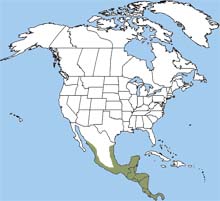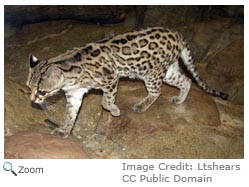Margay - Leopardus wiedii |
||||||||
Description
Range |
HabitatThe margay makes its home in tropical and subtropical forests. DietThe margay eats a wide variety of food including birds, bird eggs, small mammals, reptiles, and fruit. It hunts primarily in trees.
Life CycleMargays mate year-round. Females give birth to one or two young three to four months after mating. The kittens begin to eat meat when they are about eight weeks old. Behavior |
|||||||


 The margay is found from Mexico to Argentina. It was once found in the United States in Texas. The last margay seen in the United States was spotted in Texas in the 1850s.
The margay is found from Mexico to Argentina. It was once found in the United States in Texas. The last margay seen in the United States was spotted in Texas in the 1850s.
